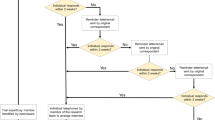Abstract
The Kennedy Krieger lead paint study is a landmark case in human experimentation and a classic case in research ethics. In this paper I use the lead paint study to assist in the analysis of the ethics of research on less expensive, less effective interventions. I critically evaluate an argument by Buchanan and Miller who defend both the Kennedy Krieger lead paint study and public health research on less expensive, less effective interventions. I conclude that Buchanan and Miller’s argument is flawed but that does not mean that research designed to find less effective interventions cannot be justified in some situations. Based on my analysis, I suggest questions to ask when considering such research and I offer some principles to guide us. In the process, light is shed on the various debates and issues raised by the lead paint study; e.g. standards of care, researchers’ responsibilities to research subjects, the distinction between treatment and research and the question of what it is that legitimizes public health research.
Similar content being viewed by others
References
Applebaum, P.S., & Lidz, C.W. (2006). Clinical ethics versus clinical research. The American Journal of Bioethics, 6, 53–55. doi:10.1080/15265160600755615.
Beauchamp, T., & Childress, J. (2001). Principles of biomedical ethics (5th ed.). New York:: Oxford University Press.
Bor, J. 2001. Kennedy Krieger doctor defends lead paint study: Researcher disputes High Court’s findings. The Baltimore Sun. August 18, B1.
Buchanan, D., & Miller, F.G. (2006). Justice and fairness in the Kennedy Krieger Institute lead paint study: the ethics of public health research on less expensive, less effective interventions. American Journal of Public Health, 96, 781–787. doi:10.2105/AJPH.2005.063719.
Coney, S., & Bunkle, P. (1988). An “unfortunate experiment” at National Women’s. In special supplement: “An unfortunate experiment”. Monash Bioethics Review, 8, 1–36 (originally published in Metro. 1987 June; 47–65).
Edwards, S.J., Lilford, R.J., & Hewison, J. (1998). The ethics of controlled trials from the perspectives of patients, the public, and healthcare professionals. British Medical Journal, 317, 1209–1212.
Friedman Ross, L. (2002). In defense of the Hopkins lead abatement studies. The Journal of Law, Medicine & Ethics, 30, 50–57. doi:10.1111/j.1748-720X.2002.tb00719.x.
Friedman Ross, L. (2006). Children in medical research. Oxford: Clarendon.
Glantz, L.H. (2002). Nontherapeutic research with children: Grimes v Kennedy Krieger Institute. American Journal of Public Health, 92, 1070–1073.
Grimes v Kennedy-Krieger Institute 2000. 782 F2d807 (Ct App Md 2001). Maryland Court of Appeals. 2001; no, 128, September Term. http://www.courts.state.md.us/opinions/coa/2001/128a00.pdf (accessed June 1, 2007)
Kaiser, J. (2001). Court rebukes Hopkins for lead paint study. Science, 293, 1567–1569. doi:10.1126/science.293.5535.1567b.
Kennedy-Krieger Institute 1992. Lead paint abatement and repair & maintenance study clinical investigation consent form (August 10). Kennedy-Krieger Institute.
Kent, D.M., Fendrick, A.M., & Langa, K.M. (2004). New and dis-improved: On the evaluation and use of less effective, less expensive medical interventions. Medical Decision Making, 24, 281–286. doi:10.1177/0272989X04265478.
Kopelman, L.M. (2002a). Group benefit and protection of pediatric research subjects: Grimes v. Kennedy Krieger and the lead abatement study. Accountability in Research, 9, 177–192. doi:10.1080/08989620214682.
Kopelman, L.M. (2002b). Pediatric research regulations under legal scrutiny: Grimes narrows their interpretation. The Journal of Law, Medicine & Ethics, 30, 38–49. doi:10.1111/j.1748-720X.2002.tb00718.x.
London, A.J. (2003). Children and ‘minimal risk’ research: The Kennedy-Krieger lead paint study. In B. Steinbock, J. Arras, & A. London (Eds.), Ethical issues in modern medicine (pp. 787–791). New York: McGraw Hill.
Mastroianni, A.C., & Kahn, J.P. (2002). Risk and responsibility: ethics, Grimes v Kennedy Krieger, and public health research involving children. American Journal of Public Health, 92, 1073–1076.
Milgram, S. (1969). Obedience to authority. New York: Harper Row.
Needleman, H.L., & Landrigan, P.J. (1994). Raising children toxic free. New York: Farrar, Straus and Giroux.
Needleman, H. (1998). Childhood lead poisoning: The promise and abandonment of primary prevention. American Journal of Public Health, 88, 1871–1876.
Nelkin, D. (1994). Forbidden research: Limits to inquiry in the social sciences. In E. Erwin, D. Gendin, & L. Kleiman (Eds.), Ethical issues in scientific research (pp. 355–370). New York: Garland.
Nelson, R.M. (2002). Appropriate risk exposure in environmental health research. The Kennedy-Krieger lead abatement study. Neurotoxicology and Teratology, 24, 445–449. doi:10.1016/S0892-0362(02)00236-2.
Nelson, R.M. (2005). Justice, lead, and environmental research involving children. In E. Kodish (Ed.), Ethics and research with children (pp. 161–177). Oxford: Oxford University Press.
Pinder, L. (2002). Commentary on the Kennedy Krieger Institute lead paint repair and maintenance study. Neurotoxicology and Teratology, 24, 477–479. doi:10.1016/S0892-0362(02)00244-1.
Rachels, J. (1998). Ethical theory and bioethics. In H. Kuhse, & P. Singer (Eds.), A companion to bioethics (pp. 15–23). Oxford: Blackwell.
Resnik, D.B., & Zeldin, D.C. (2005). Research on environmental health interventions: Ethical problems and solutions. Accountability in Research, 12, 69–101. doi:10.1080/08989620590957157.
Reversby, S.M. (Ed.) (2000). Tuskegee’s truths. Chapel Hill: University of North Carolina Press.
Rothman, D. (1982). Were Tuskegee & Willowbrook’ studies in nature? The Hastings Center Report, 12, 5–7. doi:10.2307/3561798.
Spriggs, M. (2004). Canaries in the mines: Children, risk, non-therapeutic research and justice. Journal of Medical Ethics, 30, 176–181.
Spriggs, M. (2006). Can children be altruistic research subjects? The American Journal of Bioethics, 6, 49–50. doi:10.1080/15265160600862445.
United States Department of Health and Human Services, Office for Human Protections 2002. Determination letters. August 19 2002, Johns Hopkins University School of Medicine/Kennedy Krieger Institute. http://www.hhs.gov/ohrp/detrm_letrs/YR02/aug02c.pdf (accessed June 15, 2007)
Weiss, R., T. Doran, and S. Leviton 2001. Ruling hurts sick kids. Baltimore Sun, Sept 23. http://www.hopkinsmedicine.org/press/2001/SEPTEMBER/SUNoped.htm (accessed June 13, 2007)
Author information
Authors and Affiliations
Corresponding author
Additional information
Merle Spriggs is supported by a grant from the Alfred Felton Bequest which is managed by ANZ Trustees.
Rights and permissions
About this article
Cite this article
Spriggs, M. The Ethics of Research on Less Expensive, Less Effective Interventions: A Case for Analysis. Bioethical Inquiry 5, 295–302 (2008). https://doi.org/10.1007/s11673-008-9111-8
Received:
Accepted:
Published:
Issue Date:
DOI: https://doi.org/10.1007/s11673-008-9111-8




